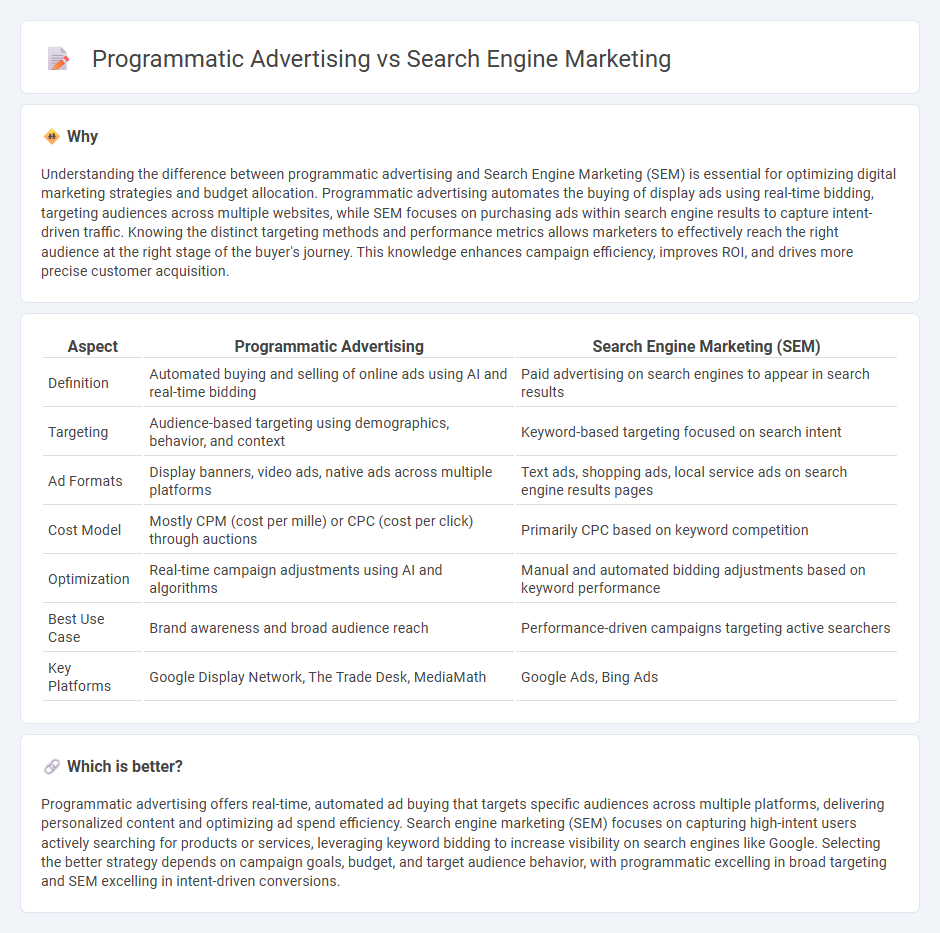
Programmatic advertising leverages automated systems to purchase digital ad space in real time, optimizing audience targeting and budget efficiency across multiple platforms. Search engine marketing (SEM) focuses on increasing visibility through paid search ads on search engines, targeting users actively seeking specific information or products. Explore the key differences, benefits, and ideal use cases of programmatic advertising versus search engine marketing to refine your digital marketing strategy.
Why it is important
Understanding the difference between programmatic advertising and Search Engine Marketing (SEM) is essential for optimizing digital marketing strategies and budget allocation. Programmatic advertising automates the buying of display ads using real-time bidding, targeting audiences across multiple websites, while SEM focuses on purchasing ads within search engine results to capture intent-driven traffic. Knowing the distinct targeting methods and performance metrics allows marketers to effectively reach the right audience at the right stage of the buyer's journey. This knowledge enhances campaign efficiency, improves ROI, and drives more precise customer acquisition.
Comparison Table
| Aspect | Programmatic Advertising | Search Engine Marketing (SEM) |
|---|---|---|
| Definition | Automated buying and selling of online ads using AI and real-time bidding | Paid advertising on search engines to appear in search results |
| Targeting | Audience-based targeting using demographics, behavior, and context | Keyword-based targeting focused on search intent |
| Ad Formats | Display banners, video ads, native ads across multiple platforms | Text ads, shopping ads, local service ads on search engine results pages |
| Cost Model | Mostly CPM (cost per mille) or CPC (cost per click) through auctions | Primarily CPC based on keyword competition |
| Optimization | Real-time campaign adjustments using AI and algorithms | Manual and automated bidding adjustments based on keyword performance |
| Best Use Case | Brand awareness and broad audience reach | Performance-driven campaigns targeting active searchers |
| Key Platforms | Google Display Network, The Trade Desk, MediaMath | Google Ads, Bing Ads |
Which is better?
Programmatic advertising offers real-time, automated ad buying that targets specific audiences across multiple platforms, delivering personalized content and optimizing ad spend efficiency. Search engine marketing (SEM) focuses on capturing high-intent users actively searching for products or services, leveraging keyword bidding to increase visibility on search engines like Google. Selecting the better strategy depends on campaign goals, budget, and target audience behavior, with programmatic excelling in broad targeting and SEM excelling in intent-driven conversions.
Connection
Programmatic advertising and search engine marketing (SEM) share a data-driven approach that enhances targeting precision and campaign efficiency. Programmatic platforms use real-time bidding and audience segmentation to display ads, while SEM focuses on optimizing paid search results based on keyword relevance and user intent. Together, they leverage machine learning algorithms and analytics to maximize ROI through personalized advertising across multiple digital channels.
Key Terms
Keyword Bidding
Search engine marketing (SEM) primarily revolves around keyword bidding to target specific search queries, ensuring ads appear when users enter relevant terms. Programmatic advertising, while it can incorporate keyword targeting, largely relies on automated real-time bidding across various channels, optimizing for audience behavior and contextual data beyond search terms. Explore these strategies further to understand which approach maximizes your advertising ROI.
Real-Time Bidding
Search engine marketing (SEM) targets users actively searching for specific keywords, while programmatic advertising leverages Real-Time Bidding (RTB) to automate ad purchasing across multiple platforms using data-driven algorithms. RTB enables advertisers to bid on individual impressions in milliseconds, optimizing ad spend by reaching precise audience segments at the right moment. Explore the benefits and differences of SEM and programmatic advertising with RTB to enhance your digital marketing strategy.
Audience Targeting
Search engine marketing (SEM) leverages keyword intent to target audiences actively searching for specific products or services, optimizing ad visibility on platforms like Google Ads. Programmatic advertising uses real-time bidding and data-driven algorithms to deliver personalized ads across multiple channels, targeting users based on demographics, behavior, and interests. Explore how integrating SEM and programmatic strategies can maximize audience engagement and campaign ROI.
Source and External Links
What is search engine marketing (SEM)? - Optimizely - Search engine marketing (SEM) is a digital marketing strategy focused on increasing a website's visibility in search engine results pages (SERPs) primarily through paid search advertising, also called pay per click (PPC), designed to efficiently drive immediate traffic and target consumers with commercial intent.
The Importance of Search Engine Marketing in Digital Marketing - Search engine marketing enhances product or service visibility on search engines like Google and Bing using paid ads and optimization techniques, playing a pivotal role in digital marketing by driving targeted traffic, increasing sales, generating leads, and raising brand awareness in an environment where 91% of online adults use search engines to find information.
What Is SEM? The Definitive Guide to Search Engine Marketing - SEM combines paid ads and SEO tactics to improve website visibility and attract relevant traffic by leveraging keywords that match user search intent, ultimately helping businesses generate leads, increase revenue, and grow by appearing prominently in search results with paid and organic listings.
 dowidth.com
dowidth.com